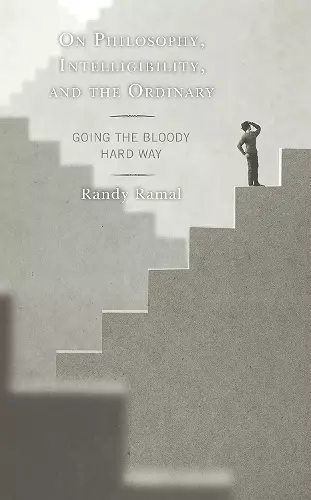On Philosophy, Intelligibility, and the Ordinary
Going the Bloody Hard Way
Format:Hardback
Publisher:Bloomsbury Publishing PLC
Published:4th Feb '21
Currently unavailable, and unfortunately no date known when it will be back

Randy Ramal argues that philosophy’s main responsibility lies in providing intelligibility to the ordinary language of everyday life while dispelling unwarranted skepticism. Philosophers need to go the hard way to fulfill this responsibility because of the constant and dangerous temptation to turn philosophy into a normative discipline rather than keep it as a descriptively hermeneutical enterprise. In On Philosophy, Intelligibility, and the Ordinary: Going the Bloody Hard Way, the philosophy of Alfred North Whitehead is central to Ramal’s endeavor to demonstrate the need to separate the hermeneutical responsibility of philosophy from the normative aspects of responsibility. While showing the futility of labeling Whitehead as a purely disinterested philosopher who abandons the idea that ordinariness is relevant to good philosophical thinking, Ramal frames this discussion within a larger, in-depth engagement with a vast number of thinkers, philosophers, and literary figures whose works touch on the question of the ordinary.
This book is a very timely reminder that philosophers must avoid practicing philosophy as a normative discipline. Everyone can and should argue for what he or she considers to be right and true and important. But this should not be confused with philosophizing. The main responsibility of philosophy lies in questions of sense and intelligibility, as Ramal argues with Wittgenstein, Cavell, and Phillips. It must be oriented to the ordinary, to the life-world in which we know from our common practice what we mean by our concepts. Whenever philosophers confuse their own rational constructions with the reality they seek to reconstruct, they commit the fallacy of logical inversion. Whitehead, Rorty, Rosen, and many others have fallen into this trap, as Ramal demonstrates in detail. His clear, wide-ranging, and well-argued book sharpens the eye for the blind alleys into which philosophy gets if it does not avoid this fallacy. -- Ingolf U. Dalferth, Claremont Graduate University
This is a courageous book in the sense that Ramal is arguing against the widespread view that philosophy’s task is largely (or exclusively) normative. By contrast, Ramal thinks that philosophy’s primary responsibility is to provide intelligibility. Relying primarily on Wittgenstein and Whitehead (but also on several other authors), Ramal thinks that philosophers should be primarily concerned with clarifying discourse, rather than with offering normative guidance. This thesis is explored with respect to a wide range of topics: ordinary language, experience, theism/atheism, the lives of nonhuman animals, etc. Whatever one’s own stance, one is enlightened by Ramal’s work in the effort to articulate the proper method of philosophy as a discipline. His fear is that by jumping prematurely or in the wrong way into normative concerns, philosophers might be forgoing one of their essential tasks. -- Daniel A. Dombrowski, Seattle University
ISBN: 9781793638809
Dimensions: 228mm x 162mm x 26mm
Weight: 572g
270 pages